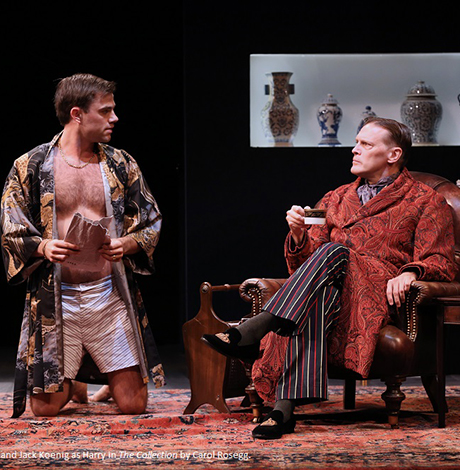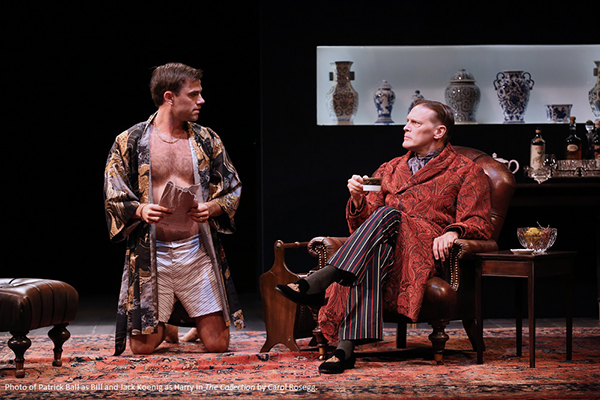Arts & Entertainment
Pinter double bill
Unexpected alliances, role playing enliven ‘60s minis


Patrick Ball (left) and Jack Koenig in ’The Collection.’ (Photo by Carol Bosegg; courtesy STC)
‘The Lover’ and ‘The Collection’
Through Oct. 29
Shakespeare Theatre Company
Lansburgh Theatre
450 7th St., N.W.
202-547-1122
Shakespeare.org
Six seasons ago, Shakespeare Theatre Company’s out artistic director made a great success with Harold Pinter’s 1971 mesmeric exploration of memory “Old Times.” Now he’s returned to Pinter with a double bill of one acts from earlier in the British playwright’s career, “The Lover” and “The Collection.”
Penned in the early 1960s originally for television broadcast, the plays are poised on the precipice of the swinging ’60s. It’s not about free sex, but rather a darkly funny examination of characters (gay and straight) who are involved in games of one-upmanship and dominance, and constructing their own truths.
“The Lover” is about Sarah (a perfectly pressed Lisa Dwan) and Richard (the excellent Patrick Kennedy), a young married couple living in a London suburb who initially seem totally average, humdrum and a bit stuffy. But then, just before Richard heads off to the office, he calmly asks Sarah if she will be seeing her lover later in the day.
She replies affirmatively. Soon it becomes clear that the husband is in fact the lover and the couple are engaged in some serious ongoing role playing. In the afternoon, Richard — in the guise of a rumpled Beatnik — returns home for a heated tryst. Awaiting his arrival, Sarah doffs her sensible day frock and slips into an alluring lace cocktail dress. But all is not of fun and games and their meetings become increasingly spiteful. Where this will lead is unclear as are their true feelings.
“The Collection,” the second of the night’s offerings, involves couples Stella and James (again Dwan and Kennedy) who have been married for two years; and prickly, middle-aged Harry (terrific out actor Jack Koenig) and his seductive, much younger boyfriend, Bill (a perfectly cast Patrick Ball). None of the four seem happy in their relationships.
Convinced that Stella and Bill had a one-night stand while away on business in Leeds, James decides to confront the competition: “You’re not a film star, but you’re quite tolerable looking, I suppose,” says James to Bill who seems gay but is presumably bisexual. Their meeting, the first of several, is a mix of menace and attraction.
Meanwhile Harry pays a fact-finding visit to Stella. What’s actually happened between Stella and Bill is confirmed and denied. Ultimately it doesn’t matter what is true or isn’t.
At an about an hour each and separated by an intermission, the pieces are finely acted and expertly rendered. Kahn has assembled a talented quartet of actors (all except Koenig new to STC) who ably handle the rhythm and silences of Pinter’s particular language. With well-timed Pinter pauses, they impart more meaning into the work than what the spoken words alone convey.
The all-woman design team is stellar. Jane Greenwood’s costumes expand on the characters’ personalities, wants and stations. Bill’s memorably form-fitting plaid trousers and Harry’s black tie and smoking robe are all spot on. Debra Booth’s remarkably serviceable set of three households impeccably reflects its respective inhabitants’ aspirations to bourgeois comfort, tidiness or cool. Mary Louise Geiger’s lighting technically clever shifts the actions from home to home while imbuing the scene with an element of mystery and suspicion.
For fans of Pinter’s unreal realism, Shakespeare’s latest is satisfyingly good. For those new to his work, it’s the perfect introduction.

Team DC, the umbrella organization for LGBTQ-friendly sports teams and leagues in the D.C. area, held its annual Night of Champions Awards Gala on Saturday, April 20 at the Hilton National Mall. The organization gave out scholarships to area LGBTQ student athletes as well as awards to the Different Drummers, Kelly Laczko of Duplex Diner, Stacy Smith of the Edmund Burke School, Bryan Frank of Triout, JC Adams of DCG Basketball and the DC Gay Flag Football League.
(Washington Blade photos by Michael Key)




















The 2024 National Cannabis Festival was held at the Fields at RFK Stadium on April 19-20.
(Washington Blade photos by Michael Key)
















Covering the @NatlCannaFest at RFK Stadium for @WashBlade . Stop by the LGBTQ+ booth and pick up a paper if you are here. pic.twitter.com/is7hnsaPns
— Michael Patrick Key (@MichaelKeyWB) April 20, 2024
Theater
‘Amm(i)gone’ explores family, queerness, and faith
A ‘fully autobiographical’ work from out artist Adil Mansoor

‘Amm(i)gone’
Thorough May 12
Woolly Mammoth Theatre
641 D St., N.W.
$60-$70
Woollymammoth.net
“Fully and utterly autobiographical.” That’s how Adil Mansoor describes “Amm(i)gone,” his one-man work currently playing at Woolly Mammoth Theatre.
Both created and performed by out artist Mansoor, it’s his story about inviting his Pakistani mother to translate Sophocles’s Greek tragedy “Antigone” into Urdu. Throughout the journey, there’s an exploration of family, queerness, and faith,as well as references to teachings from the Quran, and audio conversations with his Muslim mother.
Mansoor, 38, grew up in the suburbs of Chicago and is now based in Pittsburgh where he’s a busy theater maker. He’s also the founding member of Pittsburgh’s Hatch Arts Collective and the former artistic director of Dreams of Hope, an LGBTQ youth arts organization.
WASHINGTON BLADE: What spurred you to create “Amm(i)gone”?
ADIL MANSOOR: I was reading a translation of “Antigone” a few years back and found myself emotionally overwhelmed. A Theban princess buries her brother knowing it will cost her, her own life. It’s about a person for whom all aspirations are in the afterlife. And what does that do to the living when all of your hopes and dreams have to be reserved for the afterlife?
I found grant funding to pay my mom to do the translation. I wanted to engage in learning. I wanted to share theater but especially this ancient tragedy. My mother appreciated the characters were struggling between loving one another and their beliefs.
BLADE: Are you more director than actor?
MANSOOR: I’m primarily a director with an MFA in directing from Carnegie Mellon. I wrote, directed, and performed in this show, and had been working on it for four years. I’ve done different versions including Zoom. Woolly’s is a new production with the same team who’ve been involved since the beginning.
I love solo performance. I’ve produced and now teach solo performance and believe in its power. And I definitely lean toward “performance” and I haven’t “acted” since I was in college. I feel good on stage. I was a tour guide and do a lot of public speaking. I enjoy the attention.
BLADE: Describe your mom.
MANSOOR: My mom is a wonderfully devout Muslim, single mother, social worker who discovered my queerness on Google. And she prays for me.
She and I are similar, the way we look at things, the way we laugh. But different too. And those are among the questions I ask in this show. Our relationship is both beautiful and complicated.
BLADE: So, you weren’t exactly hiding your sexuality?
MANSOOR: In my mid-20s, I took time to talk with friends about our being queer with relation to our careers. My sexuality is essential to the work. As the artistic director at Dreams of Hope, part of the work was to model what it means to be public. If I’m in a room with queer and trans teenagers, part of what I’m doing is modeling queer adulthood. The way they see me in the world is part of what I’m putting out there. And I want that to be expansive and full.
So much of my work involves fundraising and being a face in schools. Being out is about making safe space for queer young folks.
BLADE: Have you encountered much Islamophobia?
MANSOOR: When 9/11 happened, I was a sophomore in high school, so yes. I faced a lot then and now. I’ve been egged on the street in the last four months. I see it in the classroom. It shows up in all sorts of ways.
BLADE: What prompted you to lead your creative life in Pittsburgh?
MANSOOR: I’ve been here for 14 years. I breathe with ease in Pittsburgh. The hills and the valleys and the rust of the city do something to me. It’s beautiful, it’ affordable, and there is support for local artists. There’s a lot of opportunity.
Still, the plan was to move to New York in September of 2020 but that was cancelled. Then the pandemic showed me that I could live in Pittsburgh and still have a nationally viable career.
BLADE: What are you trying to achieve with “Amm(i)gone”?
MANSOOR: What I’m sharing in the show is so very specific but I hear people from other backgrounds say I totally see my mom in that. My partner is Catholic and we share so much in relation to this.
I hope the work is embracing the fullness of queerness and how means so many things. And I hope the show makes audiences want to call their parents or squeeze their partners.




















